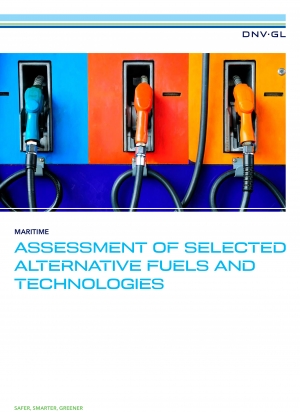


(Posted on 26/04/18)
Classification society DNV GL has issued a new white paper which assesses a range of alternative fuels and technologies. The white paper ‘Alternative fuels and technologies for greener shipping’ examines the price, availability, regulatory challenges and environmental benefits of alternative fuels and technologies, including LNG, LPG, hydrogen, fuel cells, and hybrid and battery technologies, and comparing them to the use of conventional fuel with scrubbers and new low sulphur alternatives. Through the new white paper DNV GL intends to offer the shipping industry insights that will help them in their preparations for the upcoming Global Sulphur Cap, which is due to come into effect on 1 January 2020.
“The incoming International Maritime Organization (IMO) sulphur cap on emissions from shipping could have a significant effect on the maritime industry, and it has the potential to be a game changer for alternative fuels,” says Trond Hodne, Senior Vice President, Sales & Marketing Director at DNV GL – Maritime. “Our new white paper is designed to set out the options for interested stakeholders and to offer a balanced assessment of the potential of these fuels and technologies going forward. We hope that by doing so we can add to the growing body of knowledge and enable investment decisions to be made with greater certainty and confidence.”
The technologies and fuels considered in the white paper are many of the most commonly used in the shipping industry today: LNG, LPG, methanol, biofuel, hydrogen, battery systems, fuel cell systems, and wind-assisted propulsion. The white paper identifies and examines the factors that will affect the uptake and acceptance of alternative fuels and technologies in shipping, including: environmental compatibility, availability, fuel costs and the international rules within the IGF Code. Over the short term, the white paper foresees that the vast majority of conventionally fuelled vessels already in service will either switch to low sulphur conventional fuels, or implement a scrubber system while continuing to use heavy fuel oil (HFO).
For newbuilding vessels, the sulphur cap could be a major driver for alternative fuels, and DNV GL’s Gerd Würsig, Business Director Alternative fuelled ships, at DNV GL – Maritime, believes that LNG is the prime contender among them: “LNG has already overcome the barriers related to international legislation and is available in sufficient quantities today to meet the requirements of the shipping industry for many years. It also fits within the trend of demands to lower emissions of CO2, NOx and particulate matter. At the end of the day however, the best concept for a given application needs to be determined by the shipowner on a case-by-case basis, and at DNV GL we are ready to assist in finding the best solution.”
AtoB@C Shipping, a subsidiary of ESL Shipping, has announced the successful delivery of Fleximar, the... Read more
Western Bulk, together with reputable Norwegian partners A/S J. Ludwig Mowinckels Rederi, Premium Maritime... Read more
Pacific Basin Shipping Limited, one of the world’s leading dry bulk shipping companies, has announced... Read more
Columbia Group anticipates a period of strong expansion as an increasing number of international shipowners... Read more
Norse?Ship Management has expanded its use of Smart Ship Hub’s high frequency sensor data and... Read more
As the maritime industry gears up to welcome the IMO’s STCW bullying and harassment training amendments... Read more
NORDEN has acquired the cargo activities of Taylor Maritime in Southern Africa (previously operated... Read more
Philippos Ioulianou, Managing Director of EmissionLink, has warned the IMO’s decision to delay... Read more
VIKAND has highlighted the need for cultural change in the maritime sector as reports of bullying, harassment... Read more
The maritime industry is experiencing a period of significant transformation, driven by rapidly evolving... Read more